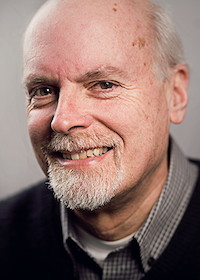 It's not often I come out of a dissertation defense with my head spinning and my heart breaking. But this is in fact what happened to me this week as I listened to Dan Jarrell's presentation of his paper. On the surface, a title that reads "Beyond Technology: Albert Borgmann's 'Device Paradigm' And Its Implications for American Evangelical Churches" may not cause someone to stop in their tracks. But I will tell you that this paper has given me pause and challenged me to some serious reflection.
It's not often I come out of a dissertation defense with my head spinning and my heart breaking. But this is in fact what happened to me this week as I listened to Dan Jarrell's presentation of his paper. On the surface, a title that reads "Beyond Technology: Albert Borgmann's 'Device Paradigm' And Its Implications for American Evangelical Churches" may not cause someone to stop in their tracks. But I will tell you that this paper has given me pause and challenged me to some serious reflection.Dan is a pastor of one of the largest churches in Alaska (ChangePoint in Anchorage). The catalyst for this project was a D.Min. prof, Andy Crouch, who pointed Dan to Borgmann's writing (e.g. Power Failure: Christianity in the Culture of Technology). Crouch is one of the best thinkers on culture (note his book Culture Making: Recovering Our Creative Calling). It was also fueled by Dan's own growing frustration with the problem of consumerism in the church and the wholesale marketing of sacred things as if they were commodities to be consumed. He took the ideas of Albert Borgmann and applied them to the philosophy, culture, and practice of American evangelical churches in general and American megachurches in particular.
 Here's a powerful paragraph, just a sample of what Dan is saying in much of his work:
Here's a powerful paragraph, just a sample of what Dan is saying in much of his work:
Consumers find freedom in devices that deliver what they value, becoming dependent upon those devices and embracing a "device paradigm" that shapes their view of life. Over time, consumers lose all sense of the value of process. They think technologically, expecting their needs to be addressed through devices, even when those needs cannot be commoditized. I contend that American evangelicals have learned to think of spiritual maturity and community as commodities. They expect their churches to provide the devices necessary for enjoying those commodities with minimal engagement in the processes that create and cultivate them. Churches grow if their programs and services seem to deliver what is expected, yet neither maturity nor community is a commodity. Neither can be enjoyed without full participation in process. The result is ironic: churches that are most effective in delivering a product are least effective in making disciples.
As I listened to the presentation, I found much of what was said disturbing, not because anything was wrong, but because so much of what we have allowed ministry to become has gotten off center. Dan essentially shared that this project has been his own journey of repentance-shifting from "device" thinking to "grace" thinking. Device thinking focuses on efficiency (best means to achieve an end), calculability (bigger is always better), predictability (making people feel comfortable and safe), and control (institutionalizing and packaging). This is what a technological society values. It is also what pastors can come to value, especially as the church grows into a large corporation.
In contrast, grace thinking is much more interested in participation (how can we get maximum personal engagement with what matters?) and contingency (creating space for the inefficient, the immeasurable, the unexpected, and the uncontrolled).
Just as our consumerism culture has reduced, fragmented things into mere commodities to consume, assisted by machine and technology, so the church has tended to fragment, reduce, mechanize the things that are focal, transcendent, things that provide a center of orientation. It looks something like this-worship is reduced to excellence on stage, with passive observers expecting something more next week; fellowship gets reduced to giving units; obedience gets reduced to legalism; sacrament gets reduced to an efficient prefilled communion cup with wafer; and the Bible gets reduced to a sermon extracted from its metanarrative-e.g. "7 tips to Marital Happiness").
So what needs to happen? Here are some of Dan's thoughts:
- We need to repent of our tendency to follow the ways of a reductionist culture.
- We must reconsider how we evaluate success. Our metrics need to count servants, not listeners; celebrate initiative (people finding ways to get engaged) over impact; and measure success in terms of deployment over detaining.
- We need to embrace contingency (meaning-pack your plans with margins, welcome uncertainty, provoke dialogue, and be brave to invite criticism.
Here are other things-Keep structures simple and lean. Do things with, not for, people. Turn the love boat (10% serving the 90%) into an aircraft carrier (everyone on board vital to the mission). Value personal touch over distant technology.
Too easily I find myself embracing a theology of achievement. Papers like this help me move back to a theology of alignment-with what it is God values most.
http://www.transformedblog.com/2012/03/16/rescuing-our-churches-from-consumerism/















